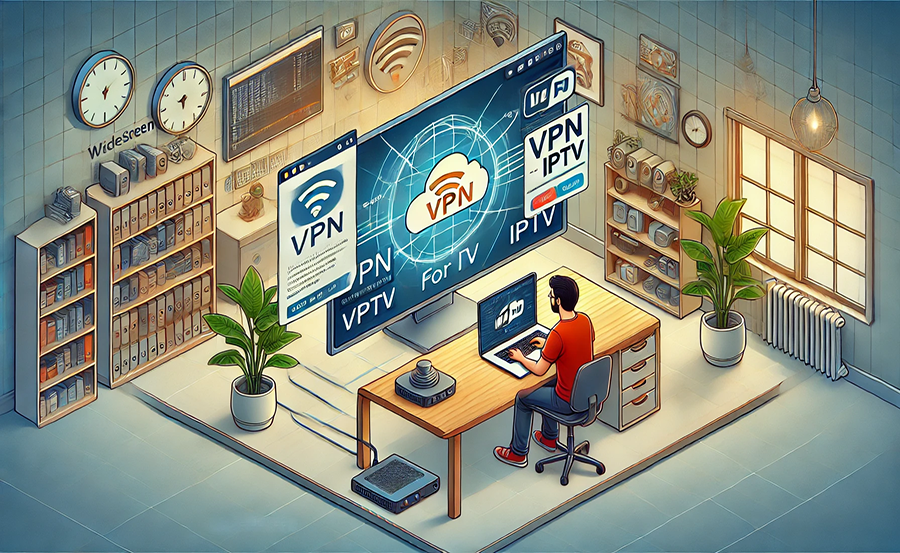In today’s digital era, we are constantly surrounded by a sea of technological advances that enhance our daily lives. Among them, IPTV has emerged as an innovative way to consume digital media. However, as much as we enjoy the convenience of accessing diverse content, security concerns remain a pressing issue. This article will guide you on how to protect your IPTV sessions on Linux, focusing on the advantages of using a VPN.
What is IPTV?
IPTV, or Internet Protocol Television, is a technology that enables television services through the internet rather than traditional methods like satellites or cable. This system allows users to stream videos, live TV, and on-demand content easily. But as you explore this vast universe of choices, it’s crucial to ensure your online safety.
With IPTV, you gain access to a world of unlimited entertainment, and services like Kemo IPTV lead the charge. They offer an unmatched IPTV experience with a wide selection of channels and user-friendly service. But while using such services, it is vital to recognize the potential threats, such as data breaches or hacking attempts.
Pro Tip:
Experience seamless streaming with 1 Month Kemo IPTV Subscription designed to provide instant access to live TV, movies, and series in stunning HD quality.
Understanding IPTV’s Popularity
The rise of IPTV can be attributed to its versatility and ease of access. As it allows for playback and streaming of a variety of content types, IPTV has quickly become a household staple. With services like Kemo IPTV, watching your favorite shows has never been more convenient.
Notably, Kemo IPTV boasts a competitive edge by offering users the best IPTV subscription in the market. Benefits include a high-quality viewing experience, abundant channels, and consistent service performance. Nevertheless, securing this streaming session is paramount, particularly when dealing with sensitive data.
Why You Need a VPN for IPTV on Linux
Linux users, much like others, face potential privacy risks when accessing IPTV services. Virtual Private Networks (VPNs) provide a layer of security that is not inherently available through IPTV services. By creating a private network over a public internet connection, VPNs protect your data by encrypting it.
For those who opt for an Unlimited IPTV Subscription, utilizing a VPN ensures that your streaming sessions remain private and secure. A VPN masks your IP address, making it difficult for malicious actors to identify and attack your device.
Security Advantages of Using a VPN
Incorporating a VPN for your IPTV use on Linux safeguards your privacy through robust encryption. This method significantly reduces the risk of unauthorized intrusions, maintaining the integrity of your personal data. Think of it as a shield, protecting your information from prying eyes.
Moreover, a VPN helps in circumventing geographical restrictions. This means you can fully enjoy your Kemo IPTV subscription without worrying about content blocks, ensuring a seamless experience anywhere in the world.
Steps to Set Up a VPN for IPTV on Linux
Choosing the Right VPN Provider
The first step in safeguarding your IPTV session is selecting a reputable VPN service. Consider factors such as speed, reliability, security protocols, and customer support. Look for providers that offer robust encryption and no-log policies.
Some of the top-rated VPN services include NordVPN, ExpressVPN, and CyberGhost. These providers offer Linux support, ensuring that setting up and integrating with your KemoIPTV becomes a hassle-free process.
Installing a VPN on Linux
Most VPN providers offer guides and tools to help Linux users install their services. The installation process may vary slightly between distros, so follow the instructions specific to your system. Generally, you will download and run a shell script, or set up the VPN manually through network settings.
Configuring VPN Settings
Once installed, configuring your VPN is essential for optimizing use with IPTV. Adjust settings to suit your preferences, including choosing the fastest server for optimal streaming quality through KemoIPTV. Regularly update your VPN to maintain top security standards.
Testing and Troubleshooting
Ensure that your VPN is functioning correctly by conducting leak tests and examining connection speeds. If performance issues arise, consult your VPN provider’s support pages or forums. Often, the solution is a simple configuration tweak or reconnecting to a different server.
Enhancing IPTV Performance with a VPN
Optimizing Streaming Speed
Many users worry that a VPN might slow down their internet connection. However, by selecting the right server and leveraging advanced VPN features, you can ensure fast and stable streaming of Kemo IPTV content without interruption.
Minimizing Buffering and Lag
Buffering and lag are common issues with online streaming. VPNs can sometimes improve connectivity by bypassing throttling imposed by ISPs. Choose servers closer to your geographical location for fewer delays and smoother playback.
The Bottom Line on Using a VPN for IPTV on Linux
Combining a VPN with your Unlimited IPTV Subscription enriches your digital experience by ensuring both privacy and unrestricted access to content. Whether watching the latest blockbuster or catching up on international news, services like Kemo IPTV provide a quality experience while a VPN stands as your line of defense.
In taking these precautions, you not only enhance personal security but also address potential legal exposure due to accessing geographically restricted content. With Linux’s open-source nature making it a prime target for cyber threats, a VPN becomes not just a recommendation but a necessity.
FAQs on Using a VPN with IPTV on Linux

1. What is Kemo IPTV?
Kemo IPTV is a service that offers a wide range of television channels and on-demand content via internet streaming. Known for its high-quality stream and expansive library, it is considered one of the best IPTV subscriptions available.
2. Why should I use a VPN with my Kemo IPTV subscription?
A VPN enhances the security and privacy of your internet connection while using IPTV. It protects against data breaches and ensures uninterrupted access to diverse content despite geo-restrictions.
3. Are there specific VPNs recommended for Linux users?
Yes, VPNs like NordVPN, ExpressVPN, and CyberGhost are often recommended for Linux due to their strong encryption protocols, ease of installation, and excellent customer support for Linux users.
4. Will using a VPN slow down my IPTV streaming?
While it’s possible to experience a slight decrease in speed due to encryption, many users find the difference negligible. Choosing a nearby server and a high-speed VPN typically mitigates performance drops.
5. How does a VPN help bypass IPTV restrictions?
A VPN can spoof your location by masking your IP address, allowing access to region-locked content. This feature enables you to fully enjoy your Kemo IPTV subscription regardless of where you are.
6. What additional steps can I take to ensure secure IPTV browsing?
Alongside using a VPN, staying updated with software patches, employing strong password policies, and avoiding unknown networks significantly bolster your online security while using IPTV.
Suggested Apps for Correcting Audio Sync on IPTV

